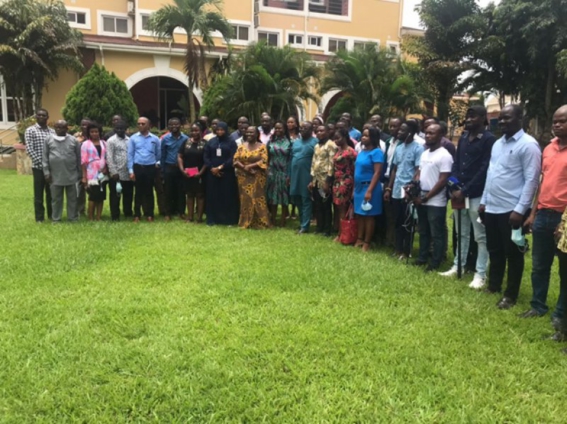About 30,000 household toilet facilities are expected to be provided for people in low-income communities in the Greater Kumasi Metropolitan Area (GKMA).
Additionally, a total of 5,000 households will be supported to connect potable water into their homes, under the Greater Kumasi Sanitation and Water Project.
This is to help ensure increased access to improved toilet and water facilities to the majority of poor and vulnerable people in urban and peri-urban communities.
Minister for Sanitation and Water Resources, Cecilia Abena Dapaah said this at a day’s orientation workshop on the Greater Kumasi Sanitation and Water Project for some media personnel in Kumasi.
The workshop was aimed at introducing the project which was launched in November last year to the media in the Ashanti region.
The project, according to the Minister, has four components which were mainly to increase access to sanitation services to people in low-income and deprived areas.
It would also help to support the expansion of the water distribution networks in GKMA to provide water for an estimated 150,000 people.
Again it would strengthen institutions and provide technical assistance to stakeholders in the water and sanitation sector.
The project beneficiaries are the eight Metropolitan and Municipal assemblies in the GKMA, which include the Kumasi Metropolitan Assembly (KMA), Asokwa, Oforikrom, old Tafo, Suame, Kwadaso, and the Asokore Mampong Municipal Assemblies.
Madam Dapaah said the facilities would be maintained and expanded as the population in those areas increased.
The Minister pointed out that the water supply in Kumasi was not good, saying the Owabi headworks in the Atwima Nwabiaqya District would soon be dredged.
The government she said was providing pragmatic measures to find a lasting solution to the water and sanitation problems in Kumasi.
Madam Dapaah called on the media to take an active part in making sure that the agenda of making the country clean was achieved,
The Project Coordinator, Mr George Asiedu said a steering committee had been established to ensure the sustainability of the project to provide a safe sewage system.
Engineer for the project, Kwadwo Gyasi pledged to work to provide sustainable clean, and hygienic toilet facilities for the people.
He said it was Bio-digester technology that degrades faecal matter into smaller particles,
Mr Gyasi called on the media to educate the public on improved water and sanitation practices.
Latest Stories
-
Ghana Party in the Park to mark 20th anniversary with unforgettable celebrations
3 minutes -
State institutions that fail to sign performance contracts will be sanctioned – SIGA boss warns
15 minutes -
Photos: Dagbon Overlord pays courtesy call on Mahama
17 minutes -
When Nigeria becomes great, Africa will be great: A Pan-African perspective on the continent’s destiny
49 minutes -
My gov’t will not sideline traditional rulers – Mahama
1 hour -
Anabel Rose takes over Open Mic with In Bloom Experience
1 hour -
Gifty Oware-Mensah used NSS allowance as collateral for GH₵30m loan from ADB – Ayine claims
1 hour -
Irate youth block Samereboi roads over arrest of illegal miners
2 hours -
Ghana’s urban population to grow 2.7% year-on-year over next 10 years
2 hours -
Vola Money launches Remittance-as-a- Service platform to support global money transfers
2 hours -
Asante Gold Chirano Limited awards 31 tertiary scholarships to brilliant but needy students
2 hours -
National FMCG Summit and Awards 2025 ignites future of consumer goods
2 hours -
AUCB and HAEC host innovative 2025 Capstone Projects
2 hours -
GCYE launches National Business Agenda to tackle youth and women’s economic exclusion
2 hours -
Government committed to stabilising cedi at GH¢10 to dollar – Seth Terkper
2 hours

